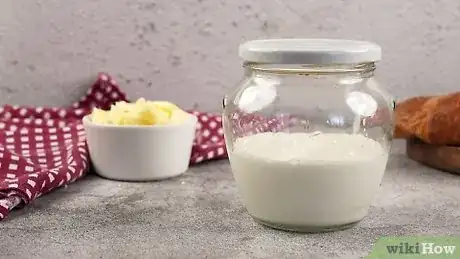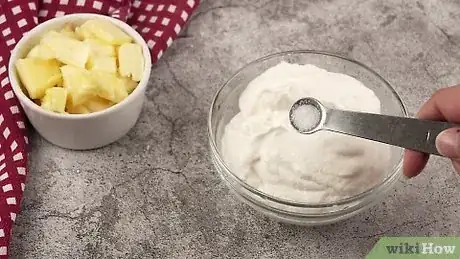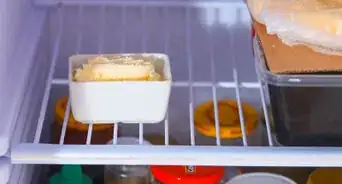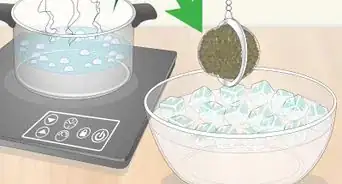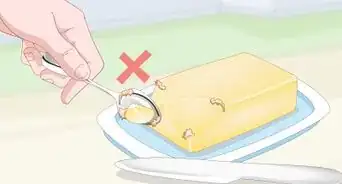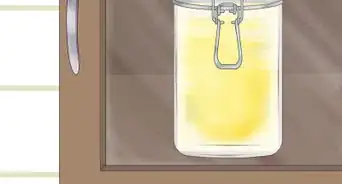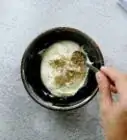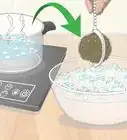This article was co-authored by wikiHow Staff. Our trained team of editors and researchers validate articles for accuracy and comprehensiveness. wikiHow's Content Management Team carefully monitors the work from our editorial staff to ensure that each article is backed by trusted research and meets our high quality standards.
The wikiHow Culinary Team also followed the article's instructions and verified that they work.
This article has been viewed 55,428 times.
Learn more...
You can make butter with a single ingredient and only one tool. All you need is heavy whipping cream and a jar to make delicious homemade butter. You can season your butter with salt or other herbs. Your butter can be used in baking or as a spread for toast.
Ingredients
- Heavy Whipping Cream
- 1 Canning Jar with a Lid and Ring
Steps
Beginning the Process
-
1
-
2Shake the jar. Seal the jar and shake it vigorously until the cream begins to form into butter. This takes a great deal of effort and it may be awhile before you see results. Have patience and keep shaking the jar. Eventually, butter will begin to form.[3]
- After awhile, you will see the heavy whipping cream solidifying. It will begin to form a yellowish color resembling butter.
- You will also see some liquid separating from the butter. This is a normal part of the process. Not all of the cream will form into butter. It's normal to have some buttermilk on the top.
- Keep shaking the jar until there is a clear separation between the butter at the bottom of the jar and the liquid on the top.
Advertisement -
3Pour out the excess liquid. Open your jar and select another container, such as a Tupperware container. Slowly pour out the liquid from the top of the jar. This is buttermilk, which is used in a variety of baked goods. If you bake frequently, it may be worth it to save the buttermilk.[4]
- If a little butter slips out when you're pouring out the buttermilk, do not worry. You can use a spoon to scoop it out of the container and place it back in the jar.
- As butter may slip out, do not drain the buttermilk over the sink. Even if you intend to discard the buttermilk, drain it into a container.
Finishing Your Butter
-
1Add salt to taste, if you wish. A little salt will enhance the flavor of your butter. Butter may taste a little dull if you don't sprinkle some salt onto it. Sprinkle salt over your butter until it reaches your desired taste.[5]
- If you plan to use your butter for a recipe that calls for unsalted butter, refrain from using salt.
-
2Store your butter in the refrigerator. Keep your butter in the fridge. This will prolong its shelf life. You can use your jar as a storage container or place the butter in a Tupperware container.[6]
-
3Knead out excess buttermilk if you're not using your butter right away. Homemade butter has a shorter shelf life than butter you would purchase at the store. If you're not going to use your butter for a bit, you should knead out excess buttermilk. This will make homemade butter last slightly longer.[7]
- Run cold water over your butter as you knead it. Work the butter with your hands until it's firmer and a lot of buttermilk has leaked out. This will take several minutes.
- This is a very messy process. Expect that your hands will get dirty when kneading homemade butter.
Using Your Butter
-
1Add herbs to your butter. You can add some flavor to your butter with your herbs. If you're adverse to using salt, herbs can also make your butter flavorful. If you're using your butter for a particular dish, like garlic bread, herbs can help.[8]
- Choose a combination of herbs you enjoy. If you're going for, say, an Italian seasoning, opt for herbs like basil, oregano, and garlic powder.
- Things like rosemary and thyme also taste good in butter.
-
2Use your butter in baking. Homemade butter can work great in baked goods. Homemade butter may give baked goods a fresher, creamier taste.[9]
- As homemade butter can be a litter runnier than regular butter, you may want to knead butter under running water before using it in baked goods.
-
3Add butter to bread-based items. You can use your homemade butter as a spread. Many people find the taste of homemade butter fresher and tastier than other types of butter. Try using homemade butter on things like toast, bagels, English muffins, and other bread-based items.[10]
Community Q&A
-
QuestionWhen do I add salt? When it is liquid or solid?
 Community AnswerIt doesn't matter when you add salt. Just be sure not to add too much or else your butter will not taste good.
Community AnswerIt doesn't matter when you add salt. Just be sure not to add too much or else your butter will not taste good. -
QuestionCab I make it out of 2% milk?
 Community AnswerYes, but it requires a large amount of shaking due to the lower fat contents in 2% compared to whipping cream.
Community AnswerYes, but it requires a large amount of shaking due to the lower fat contents in 2% compared to whipping cream.
References
- ↑ https://www.thebalance.com/homemade-butter-in-a-jar-1388339
- ↑ http://allrecipes.com/recipe/234299/how-to-make-homemade-butter/
- ↑ https://www.thebalance.com/homemade-butter-in-a-jar-1388339
- ↑ https://www.thebalance.com/homemade-butter-in-a-jar-1388339
- ↑ https://www.thebalance.com/homemade-butter-in-a-jar-1388339
- ↑ https://www.thebalance.com/homemade-butter-in-a-jar-1388339
- ↑ https://www.thebalance.com/homemade-butter-in-a-jar-1388339
- ↑ https://www.thebalance.com/homemade-butter-in-a-jar-1388339
- ↑ http://happyhooligans.ca/homemade-butter/
About This Article
If you want to make butter in a jar, fill the jar halfway with heavy whipping cream. Seal the jar and shake it vigorously until the cream begins to solidify. It might take a while, but keep shaking until the cream separates into solid butter on the bottom and buttermilk on top. Open the jar and pour the liquid off the top. Add a little salt to the butter if you like, then place your butter in a sealed container in the fridge. Keep reading to learn how to knead out the remaining buttermilk to make the butter last longer!
